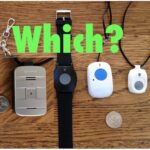By: Editorial Team | Posted: February 12, 2019 | Updated: February 13, 2025
This page contains specific medical alert recommendations for a specific type of person: one that fits a “persona” we call the “No Go” persona. These recommendations were updated in Feb. 2025.
If you are not sure if this is the right persona for you, start at our Medical Alerts: Just Tell Me What to Buy page (or review all the Medical Alert Personas).
The “No Go” Persona. Limitations. (Persona C)
People who fit this persona start to have physically quite constrained lives, spending a lot of time inside the home, and have quite significant physical or cognitive limitations. For these individuals, the conversation starts to turn to whether they are really safe at home. Perhaps they would be better off somewhere where there are full time caregivers to help watch over them.
Medical Alerts for the “No Go” Persona
The Big Picture
For this persona, if the person is largely home-bound or rarely goes out without a companion, then a system that works only “at home” is probably fine.
In addition, people in the “No Go” persona category may well have trouble with the regular charging that is required by mobile alerts.
Many of the “at home” systems have batteries that last for many months. While most of the mobile alerts need charging daily (or at best every few days). So if charging is going to be a challenge, the “at home” systems are better. But the down side, of course, is that they work only in and around the house (usually including the garden).
So, typically for this category of person we recommend an at home system, and prefer one that is as simple as possible.
For people with this persona, we think it makes sense to have an automatic fall detection “feature” in the medical alert. Most “at home” systems have this as an option, although you often need to ask for it and pay extra.
(Not sure what all the terms above mean? See our Tutorial: The Basics of Medical Alert Systems)
Will You Wear It?
There is a lot of discussion about which medical alert is more “perfect”. But in many ways, what matters most, especially for this persona, is whether people will actually wear the product.
This is an important issue for some people who fit this persona. They may be slowing down a bit. But they often still care a lot about looking stylish.
The key thing to look at here is the form factor of the medical alert. Many of them come in the form of pendants. Some come in the form of a button on a wrist band. You need to decide if one or other of these would be more likely to get worn all the time.
For technological reasons, the pendants can incorporate an automatic fall detection, whereas the wristband products from conventional medical alert vendors typically can not. So, if you want automatic fall detection, you most likely need a pendant form factor. This is what we recommend for this persona.
Update 2023: Smartwatch Medical Alerts are also a good option, so long as the somewhat more complex interface is acceptable.
As you look at the recommendations below, think hard about whether you will or will not wear the product. It is especially important to wear it at times like when you are in the bathroom or shower, as that is when many accidents happen.
Specific Recommendations
NOTE: We are intentionally limiting this page to “recommendations” without too much about the background or testing. If you want to see all the gory details, view the Medical Alert Reviews page for individual product reviews and some “Best of Breed” articles.
The specific products we recommend are mentioned in the text below. Then at the bottom of the page, you can see links to our more detailed reviews of those products, and links that send you to the manufacturers page where you can buy them if you wish.
Most people who fit this persona, will likely be best served by a simple medical alert system in the “at home” category.
This is the “traditional” category of medical alert devices. There are actually a relatively small number of different products, manufactured by a handful of manufacturers, that are then rebranded and resold by other medical alert vendors.
Many of the products are relatively similar. Service and the responsiveness of the monitoring services is an important consideration in selecting.
We don’t really have a “best of” recommendation in this category. We like the vendors MobileHelp, LifeFone, Medical Guardian, and Bay Alarm, and have had good experiences in our tests with all these vendors (in terms of service and quality of the monitoring service). We like Lively a lot too, but they don’t have a conventional “at home” product.
One of the downsides of the “at home” category is that most of the products in this category communicate with you via a speaker in the “base station”.
If you live in a small apartment this is not a big deal, as you can hear that from wherever you are. But in a big house, this can mean that after you have an emergency and press the button, the operator will be yelling at you from the base station but will not be able to hear your response. This can lead to false alarms on occasion.
Ideally, the operator would communicate via a speaker in the pendant. This is what we call “voice through the wearable”. Unfortunately most of the “at home” products do not include this feature, and those that do have a somewhat larger pendant.
If the “voice through pendant” is especially important for you, it may make sense to choose one of the “mobile medical alerts” as they all include this feature. However this comes at the cost of needing to recharge the product relatively frequently. If you want one of these mobile medical alerts, look at our suggestions for the Slow Go Persona.
Need A Different Persona?
Medical Alerts: Just Tell Me What to Buy!
Buying these Products
Below are links to our “review” page for each of some of these products, on which are a lot more details about our evaluation. These include links to the company’s websites, where you can acquire the products if you wish.
These reviews are of individual smartwatch medical alert products.
We have negotiated “discounts” with some vendors exclusively for readers of Tech-enhanced Life. See the individual reviews for details and discount codes.
*Disclosure: The research and opinions in this article are those of the author, and may or may not reflect the official views of Tech-enhanced Life.
If you use the links on this website when you buy products we write about, we may earn commissions from qualifying purchases as an Amazon Associate or other affiliate program participant. This does not affect the price you pay. We use the (modest) income to help fund our research.
In some cases, when we evaluate products and services, we ask the vendor to loan us the products we review (so we don’t need to buy them). Beyond the above, Tech-enhanced Life has no financial interest in any products or services discussed here, and this article is not sponsored by the vendor or any third party. See How we Fund our Work.

